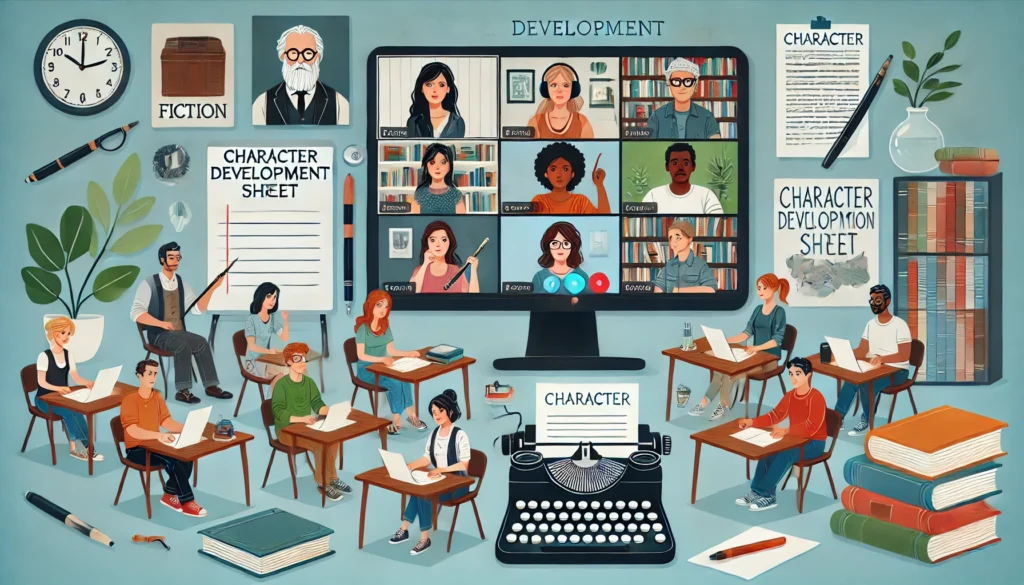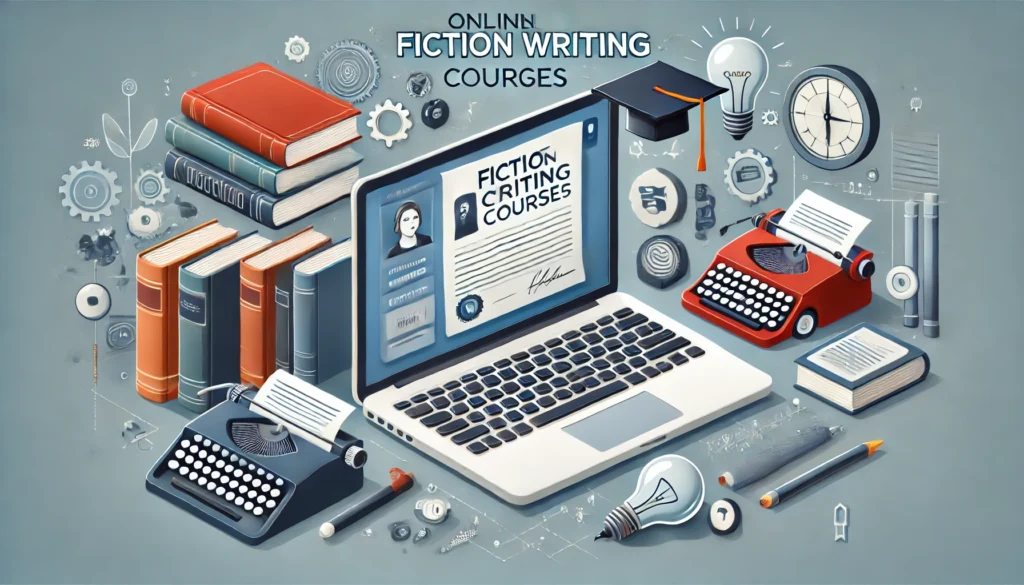Writing is an art form that often requires guidance and practice to master. While creativity is a crucial element, understanding the structure and mechanics of storytelling is equally important. Online courses offer structured learning environments where writers can explore various facets of fiction, from plot development to character arcs, under the tutelage of experienced instructors.
You may also like: Beginner-Friendly Online Creative Writing Courses

Understanding Story Structure
A well-structured story captures the reader’s interest and guides them through the narrative seamlessly. Online courses often break down story structure into key components such as the introduction, rising action, climax, falling action, and resolution. Understanding these elements helps writers create a coherent and compelling storyline.
Courses typically provide examples from literature and film to illustrate effective story structure. Analyzing these examples allows writers to see how different narratives are constructed and to apply these techniques to their own writing. By mastering story structure, writers can create narratives that are both engaging and satisfying.
Exploring Different Genres
Each fiction genre has its own conventions and expectations. Online courses often cover a range of genres, from romance to thriller, allowing writers to explore different storytelling techniques. Understanding genre conventions is crucial for writers to meet reader expectations and to innovate within the genre.
Courses typically include genre-specific writing exercises and assignments. These tasks encourage writers to experiment with different styles and themes, broadening their creative horizons. By exploring various genres, writers can discover new interests and refine their personal writing style.
Learning from Experienced Instructors
The insight and feedback provided by experienced instructors can significantly enhance a writer’s skills. Online courses often feature instructors who are accomplished authors or industry professionals. Their expertise offers valuable guidance on both the creative and technical aspects of writing.
Instructors provide personalized feedback on assignments and writing samples, helping writers identify areas for improvement. This expert guidance can accelerate a writer’s development, offering tailored advice and strategies for overcoming common writing challenges. Learning from seasoned professionals provides a solid foundation for aspiring writers to build upon.
Enhancing Storytelling Abilities
Storytelling is at the heart of fiction writing. Effective stories resonate with readers, evoke emotions, and often leave a lasting impact. Aspiring fiction writers can benefit from courses that focus on the art of storytelling, where they can learn techniques to craft compelling narratives and captivate their audience.
Crafting Engaging Plots
A compelling plot is the backbone of any great story. Online courses teach writers how to develop plots that are engaging, coherent, and well-paced. Techniques such as foreshadowing, cliffhangers, and plot twists are explored to keep readers intrigued.
Courses often include exercises on plot outlining and mapping. These tools help writers visualize the progression of their story, ensuring that each plot point logically follows the previous one. By mastering plot development, writers can create stories that captivate their audience from beginning to end.
Creating Memorable Characters
Characters are the heart and soul of any story. Online courses teach writers how to create multi-dimensional characters that readers can connect with. Techniques for developing character backstories, motivations, and arcs are explored to bring characters to life.
Courses often include character-building exercises and workshops. These activities encourage writers to delve deeper into their characters’ personalities and relationships. By creating memorable and relatable characters, writers can evoke empathy and investment from their readers.
Building Vivid Worlds
The setting of a story can greatly enhance its narrative. Online courses teach writers how to build immersive and believable worlds, whether they are grounded in reality or entirely fictional. Techniques for world-building, including creating detailed descriptions and establishing consistent rules, are covered.
Courses often include world-building exercises and assignments. These tasks encourage writers to consider the history, culture, and geography of their story’s setting. By building vivid worlds, writers can transport their readers to new and exciting places, enriching the overall reading experience.
Developing Writing Skills
Writing is a skill that improves with practice and feedback. Fiction writing courses provide the opportunity to engage in writing exercises, receive constructive critiques, and refine one’s writing style. These courses often cover essential writing skills such as grammar, style, and voice, which are critical for creating polished and professional manuscripts.
Mastering Grammar and Syntax
A strong command of grammar and syntax is essential for clear and effective writing. Online courses often include modules dedicated to teaching these fundamental skills. Writers learn to identify common grammatical errors and improve sentence structure for clarity and impact.
Courses typically include grammar exercises and quizzes to reinforce learning. These activities help writers internalize grammatical rules and apply them consistently in their writing. By mastering grammar and syntax, writers can produce work that is both professional and readable.
Developing a Unique Voice
A writer’s voice is their unique style and perspective. Online courses help writers discover and refine their voice through various writing exercises and assignments. Techniques for experimenting with different styles and tones are explored to help writers find their authentic voice.
Courses often include exercises on writing style and tone. These tasks encourage writers to experiment with different narrative voices and perspectives. By developing a unique voice, writers can stand out and create work that resonates with readers.
Receiving Constructive Feedback
Feedback is essential for growth as a writer. Online courses provide opportunities for writers to receive constructive critiques from instructors and peers. This feedback helps writers identify strengths and areas for improvement, guiding them toward more polished and effective writing.
Courses often include peer review sessions and writing workshops. These activities foster a supportive community where writers can share their work and receive diverse perspectives. By embracing feedback, writers can refine their craft and gain confidence in their abilities.

Top Online Fiction Writing Courses
In today’s digital age, aspiring writers have access to a wide array of online courses tailored to various aspects of fiction writing. Below are some of the top courses that can help you embark on your writing journey:
1. MasterClass: Neil Gaiman Teaches the Art of Storytelling
Renowned author Neil Gaiman offers an engaging and insightful course on storytelling through MasterClass. Gaiman shares his expertise on character creation, dialogue, and world-building, providing aspiring writers with invaluable insights into the craft of writing fiction. This course is ideal for those looking to learn from a master storyteller.
Course Highlights
Neil Gaiman’s course is structured around video lectures that are both informative and entertaining. He shares personal anecdotes and experiences, offering a glimpse into his creative process. The course also includes downloadable resources and a community forum for students to discuss their work and ideas.
The course emphasizes the importance of reading widely and understanding different narrative structures. Gaiman encourages students to explore their creativity and push the boundaries of their storytelling. By the end of the course, writers gain a deeper understanding of what makes a story compelling and how to apply these principles to their own work.
2. Coursera: Creative Writing Specialization
Offered by Wesleyan University, the Creative Writing Specialization on Coursera is a comprehensive program that covers elements of three major creative writing genres: short story, narrative essay, and memoir. The specialization includes courses on plot development, character creation, and setting, making it an excellent choice for writers seeking a well-rounded education in fiction writing.
Course Structure
The Creative Writing Specialization is divided into five courses, each focusing on a different aspect of writing. The program begins with an introduction to the elements of story, followed by courses on character, setting, and style. The final course is a capstone project, where students apply what they’ve learned to create a polished piece of writing.
Each course includes video lectures, readings, and assignments. Students receive feedback from peers and instructors, providing valuable insights and guidance. By completing the specialization, writers gain a comprehensive understanding of the writing process and develop a portfolio of work to showcase their skills.
3. The Novelry: The Big Idea
The Novelry offers a unique course called “The Big Idea,” which is designed to help writers develop a strong concept for their novel. This course focuses on brainstorming and refining ideas, ensuring that writers have a solid foundation for their stories before diving into the writing process. It’s perfect for writers who need help finding and developing their story’s central theme.
Course Features
“The Big Idea” course includes weekly lessons and assignments that guide writers through the process of developing a novel concept. The course covers techniques for brainstorming, refining, and testing ideas to ensure they have the potential to become compelling stories.
Writers receive personalized feedback and support from experienced instructors. The course also includes access to a community of fellow writers, providing opportunities for networking and collaboration. By the end of the course, writers have a clear and actionable plan for their novel, setting them on the path to success.
4. Udemy: Writing Science Fiction and Fantasy
For writers interested in exploring the realms of science fiction and fantasy, Udemy offers a course specifically tailored to these genres. This course covers world-building, genre conventions, and crafting believable characters in fantastical settings. It’s an excellent resource for writers looking to expand their skills in speculative fiction.
Course Components
The Udemy course includes video lectures, reading materials, and writing exercises focused on the unique challenges of science fiction and fantasy. Topics include creating consistent and immersive worlds, developing original species and cultures, and balancing realism with imaginative elements.
Writers have the opportunity to receive feedback on their work from instructors and peers. The course encourages experimentation and innovation within the genre, helping writers develop their voice and style. By the end of the course, writers have the tools and confidence to create compelling speculative fiction.
Benefits of Online Writing Workshops
In addition to structured courses, online writing workshops provide a collaborative environment where writers can share their work, receive feedback, and learn from peers. These workshops often simulate the traditional workshop experience, allowing writers to engage in discussions and gain diverse perspectives on their writing.
Engaging in Collaborative Learning
Online writing workshops foster a sense of collaboration and community among writers. Participants engage in group discussions and activities, sharing their work and ideas. This collaborative environment encourages writers to learn from one another and gain new insights into their writing.
Workshops often include group critiques and peer reviews. These sessions provide writers with diverse perspectives on their work, helping them identify strengths and areas for improvement. By engaging in collaborative learning, writers can enhance their skills and gain confidence in their abilities.
Receiving Diverse Perspectives
One of the greatest benefits of online workshops is the opportunity to receive feedback from a diverse group of writers. Participants come from various backgrounds and writing styles, offering unique perspectives on each piece of writing. This diversity enriches the feedback process and helps writers see their work from different angles.
Workshops often include exercises and activities that encourage writers to step outside their comfort zones. By embracing diverse perspectives, writers can expand their creative horizons and discover new approaches to their writing. This exposure to different ideas and styles is invaluable for growth as a writer.
Building Long-term Connections
Online workshops provide opportunities for writers to build long-term connections with fellow participants. These connections can lead to ongoing collaboration, support, and friendship. Building a network of like-minded individuals is an invaluable resource for motivation and inspiration.
Workshops often include networking sessions and social events. These activities encourage writers to connect and share their experiences. By building long-term connections, writers can create a supportive community that enhances their writing journey and provides opportunities for collaboration and growth.

Choosing the Right Course for You
With so many online fiction writing courses available, it can be challenging to choose the right one. Here are a few considerations to help you make an informed decision:
Assess Your Writing Goals
Before enrolling in a course, it’s important to assess your writing goals and determine what aspects of fiction writing you want to improve. Whether you’re looking to enhance your storytelling skills, learn about specific genres, or receive feedback on your work, identifying your goals will help you select a course that aligns with your needs.
Identifying Areas for Improvement
Reflect on your current writing skills and identify areas where you would like to improve. Consider aspects such as plot development, character creation, or world-building. By identifying specific areas for improvement, you can choose a course that focuses on those aspects and helps you achieve your writing goals.
Setting Realistic Objectives
Set realistic objectives for what you hope to achieve by taking the course. Consider factors such as time commitment, skill level, and desired outcomes. By setting clear and achievable objectives, you can stay focused and motivated throughout the course.
Aligning with Career Goals
Consider how the course aligns with your long-term career goals as a writer. Whether you’re writing for personal fulfillment or pursuing a professional writing career, choose a course that supports your aspirations and provides the skills and knowledge needed to achieve your goals.
Consider the Course Format
Online writing courses come in various formats, including video lectures, live sessions, and self-paced modules. Consider what format works best for your learning style and schedule. Some courses offer interactive components such as assignments and peer reviews, which can enhance the learning experience.
Understanding Learning Styles
Consider your preferred learning style when choosing a course format. Some writers prefer visual learning through video lectures, while others benefit from hands-on exercises and assignments. Understanding your learning style can help you choose a course format that maximizes your potential for success.
Balancing Flexibility and Structure
Consider the level of flexibility and structure you need in a course. Self-paced courses offer flexibility in scheduling, while live sessions provide a more structured learning environment. Choose a course format that fits your lifestyle and learning preferences.
Evaluating Interactive Components
Consider whether interactive components such as peer reviews and assignments are important to you. These elements can enhance the learning experience by providing opportunities for feedback and collaboration. Evaluate the course offerings to ensure they meet your needs and preferences.
Evaluate the Instructor’s Expertise
The expertise of the instructor can significantly impact the quality of the course. Research the instructor’s background, credentials, and teaching style to ensure that they have the experience and knowledge to guide you effectively in your writing journey.
Researching Instructor Credentials
Look into the instructor’s professional background and accomplishments. Consider factors such as published works, industry experience, and teaching credentials. Choosing a course with a qualified instructor ensures that you receive accurate and valuable guidance.
Understanding Teaching Style
Consider the instructor’s teaching style and approach. Some instructors may focus on technical skills, while others emphasize creativity and expression. Understanding the teaching style can help you choose a course that aligns with your learning preferences.
Seeking Student Reviews
Look for student reviews and testimonials to gain insight into the course experience. Reviews can provide valuable information about the instructor’s effectiveness and the overall course quality. Consider both positive and negative feedback to make an informed decision.
Conclusion
Embarking on a journey to become a fiction writer is an exciting and fulfilling endeavor. With the abundance of online courses available, aspiring writers have access to valuable resources and learning opportunities that can help them hone their craft and achieve their writing goals. By choosing the right course and engaging in writing workshops, you can develop your storytelling abilities, enhance your writing skills, and connect with a community of fellow writers who share your passion for fiction.
Whether you’re a budding novelist or an experienced writer looking to refine your skills, these online courses offer a pathway to success in the world of fiction writing. Explore the options, embrace the learning process, and let your creativity soar. Happy writing!
Further Reading:
Become a confident fiction author
16 Best Online Courses for Writers in 2025 [Free & Paid]
Important Note: The information contained in this article is for general informational purposes only, and should not be construed as health or medical advice, nor is it intended to diagnose, prevent, treat, or cure any disease or health condition. Before embarking on any diet, fitness regimen, or program of nutritional supplementation, it is advisable to consult your healthcare professional in order to determine its safety and probable efficacy in terms of your individual state of health.
Regarding Nutritional Supplements Or Other Non-Prescription Health Products: If any nutritional supplements or other non-prescription health products are mentioned in the foregoing article, any claims or statements made about them have not been evaluated by the U.S. Food and Drug Administration, and such nutritional supplements or other health products are not intended to diagnose, treat, cure, or prevent any disease.


